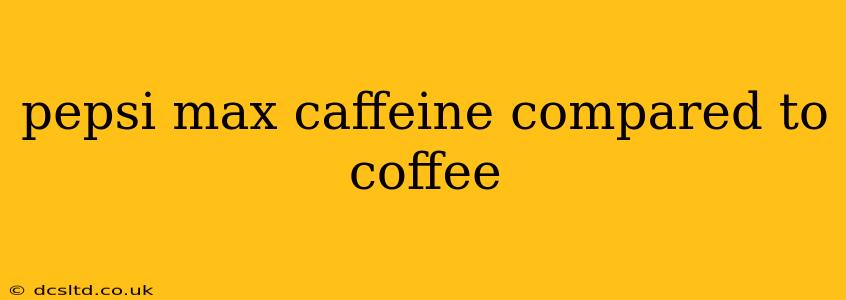Caffeine is a popular stimulant found in many beverages, including coffee and Pepsi Max. While both offer a caffeine kick, the amounts and overall effects differ significantly. This detailed comparison will delve into the caffeine content of Pepsi Max versus coffee, exploring the implications for your daily intake.
How Much Caffeine is in Pepsi Max?
Pepsi Max, a diet cola, contains a moderate amount of caffeine. The exact amount can vary slightly depending on factors like manufacturing processes and region, but generally, a 330ml can of Pepsi Max contains approximately 30-40mg of caffeine. This is a relatively small amount compared to many other caffeinated beverages.
How Much Caffeine is in Coffee?
The caffeine content in coffee is far more variable than in Pepsi Max. It depends heavily on several factors:
- Type of bean: Arabica beans generally have less caffeine than Robusta beans.
- Brewing method: Espresso tends to be more concentrated than drip coffee, resulting in higher caffeine per serving.
- Bean roast: Darker roasts often have slightly less caffeine than lighter roasts, although the difference is minimal.
- Serving size: A small cup of coffee will naturally contain less caffeine than a large one.
A typical 8-ounce cup of brewed coffee can contain anywhere from 80mg to 175mg of caffeine, and sometimes even more, depending on the factors listed above. This wide range highlights the importance of considering your coffee's origin and preparation method when assessing caffeine intake.
What about Other Coffee Drinks?
Other coffee-based drinks, such as lattes or cappuccinos, typically contain similar amounts of caffeine as a standard cup of brewed coffee, although the addition of milk or other ingredients doesn't affect the caffeine itself. However, remember that larger serving sizes will mean more caffeine.
Pepsi Max Caffeine vs. Coffee: The Key Differences
The most striking difference lies in the sheer quantity of caffeine. A cup of coffee easily surpasses the caffeine content of a can of Pepsi Max, often providing two to five times the amount. This means that for similar caffeine stimulation, you'd need to consume several cans of Pepsi Max to match just one cup of coffee.
Does the Type of Caffeine Matter?
While the amount of caffeine significantly differs, the type of caffeine is essentially the same in both Pepsi Max and coffee—it’s caffeine. There aren't different "kinds" of caffeine that lead to vastly differing physiological effects. However, other ingredients in coffee (and even in Pepsi Max, beyond caffeine) might contribute to different overall experiences.
What are the Effects of Different Caffeine Levels?
The effects of caffeine vary greatly from person to person depending on factors including sensitivity, body weight, and metabolism. However, generally, higher caffeine levels lead to a more pronounced stimulant effect. This could manifest as increased alertness, energy, and focus, but also potentially jitters, anxiety, or insomnia if the intake is excessive.
How Can I Track My Caffeine Intake?
Keeping track of your caffeine consumption is crucial, especially if you're sensitive to its effects. Using a food diary or a mobile app can help you monitor your intake from various sources, including coffee, tea, soda, and chocolate. This allows for more informed decisions to manage your caffeine consumption effectively.
Is Pepsi Max a Good Alternative to Coffee for Caffeine?
Pepsi Max can provide a smaller caffeine boost, but it's not a direct or necessarily ideal substitute for coffee. Coffee's flavor profile, aroma, and ritualistic nature are often appealing aspects for consumers, and its higher caffeine content satisfies the need for a stronger energy boost for some individuals. The choice between the two ultimately depends on individual preference and desired caffeine level.
This comprehensive comparison of Pepsi Max and coffee caffeine content clarifies the significant differences in caffeine levels and highlights the importance of considering these factors when making conscious choices about caffeine intake. Remember to consult with a healthcare professional if you have concerns about your caffeine consumption.
